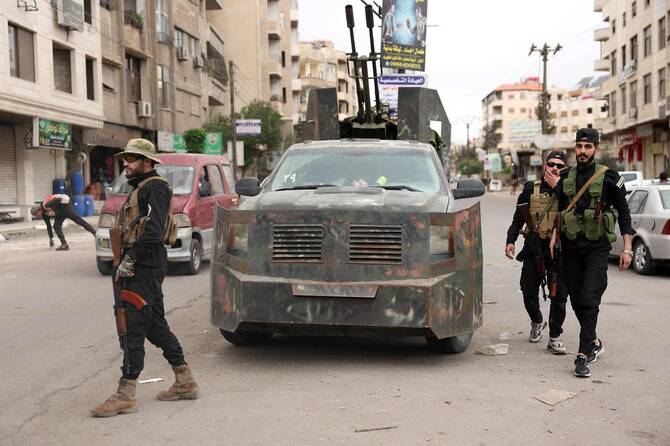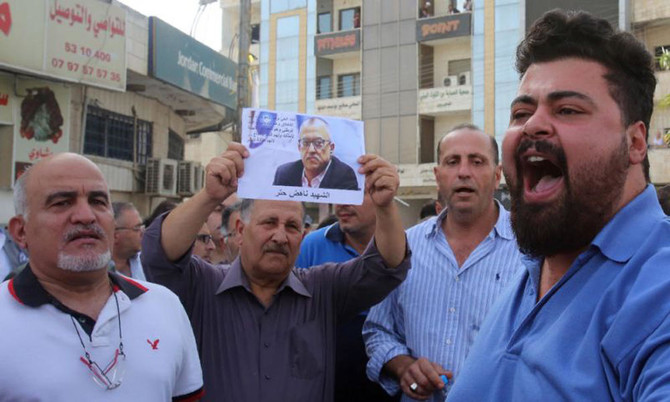15 executed: Jordan sends a message to terrorists
15 executed: Jordan sends a message to terrorists

Israeli military strikes near Syria’s presidential palace after warning over sectarian attacks

DAMASCUS, Syria: Israel’s air force struck near Syria’s presidential palace early Friday hours after warning Syrian authorities not to march toward villages inhabited by members of a minority sect in southern Syria.
The strike came after days of clashes between pro-Syrian government gunmen and fighters who belong to the Druze minority sect near the capital, Damascus. The clashes left dozens of people dead or wounded.
The Israeli army said in a statement that fighter jets struck adjacent to the area of the Palace of President Hussein Al-Sharaa in Damascus. It gave no further details.
Pro-government Syrian media outlets said the strike hit close to the People’s Palace on a hill overlooking the city.
The Druze religious sect is a minority group that began as a 10th-century offshoot of Ismailism, a branch of Shiite Islam. More than half of the roughly 1 million Druze worldwide live in Syria. Most of the other Druze live in Lebanon and Israel, including in the Golan Heights, which Israel captured from Syria in the 1967 Mideast War and annexed in 1981. In Syria, they largely live in the southern Sweida province and some suburbs of Damascus.
US meets Syria’s top diplomat, urges action to protect Druze minority

- State Department spokeswoman confirms meeting in New York between US and Syrian delegations
WASHINGTON: The United States on Thursday confirmed meeting Syria’s top diplomat and called on the interim authorities to take action on concerns, as violence flares against the Druze minority.
Syrian Foreign Minister Asaad Al-Shaibani last Friday raised his new country’s flag at the UN headquarters, marking a new chapter after the overthrowing in December of longtime ruler Bashar Assad.
State Department spokeswoman Tammy Bruce confirmed that US representatives met the Syrian delegation in New York on Tuesday.
She said that the United States urged the post-Assad authorities to “choose policies that reinforce stability,” without providing any assessment on progress.
“Any future normalization of relations or lifting of sanctions... will depend on the interim authority’s actions and positive response to the specific confidence-building measures we have communicated,” Bruce told reporters.
The demands were in line with those set out in December by the United States, then led by president Joe Biden, and include protecting minorities and preventing a role in Syria by Assad’s ally Iran.
Since the Islamist fighters toppled Assad, sectarian clashes have repeatedly flared.
The spiritual leader of the Druze community on Thursday alleged a “genocidal campaign” after two days of violence left 102 people dead.
“We urge the interim authorities to hold perpetrators of violence and civilian harm accountable for their actions and ensure the security of all Syrians,” Bruce said of the violence against Druze.
Children broken in mind and body by Israeli ‘abomination’ in Gaza

- UN health chief: ‘How much blood is enough?’
- We can’t live like this, say Palestinians
GENEVA: Palestinian children in Gaza are being physically and mentally broken by two months of an Israeli blockade on humanitarian aid and incessant pounding by airstrikes, UN health chiefs said on Thursday.
More than 1,000 children had lost limbs, thousands had severe spinal cord and head injuries from which they would never recover and many were psychologically damaged, World Health Organization emergencies chief Mike Ryan said.
“We have to ask ourselves, how much blood is enough to satisfy whatever the political objectives are?” he said. “We are watching this unfold before our very eyes, and we’re not doing anything about it.
“We are breaking the bodies and minds of the children of Gaza. We are starving the children of Gaza. We are complicit. As a physician I am angry. It is an abomination.”
Israel has interrupted or blocked the delivery of humanitarian aid to Gaza since the war began in October 2023, and imposed a total blockade on March 2. Since then the UN has repeatedly warned of a humanitarian catastrophe on the ground, with famine looming, and it said this week that acute malnutrition among Gaza’s children was worsening.
Meanwhile Israel continues to pound civilians in Gaza with daily airstrikes and artillery bombardments. Civil defense chiefs said at least 29 Palestinians were killed on Thursday. They included eight who died in an airstrike on the Abu Sahlul family home in Khan Younis refugee camp, four killed in another strike on Al-Tuffah in Gaza City, and others who died in an attack on a tent sheltering displaced people near the central city of Deir Al-Balah.
“We came here and found all these houses destroyed, and children, women and young people all bombed to pieces,” survivor Ahmed Abu Zarqa said after a deadly strike in Khan Younis.
“This is no way to live. Enough, we’re tired, enough. We don’t know what to do with our lives any more. We’d rather die than live this kind of life.”
Several countries send firefighting planes to Israel to help tackle major wildfire

JERUSALEM: Several countries were sending firefighting aircraft to Israel on Thursday as crews battled for a second day to extinguish a wildfire that had shut down a major highway linking Tel Aviv and Jerusalem and sent drivers scrambling from their cars.
The fire broke out around midday on Wednesday, fueled by hot, dry conditions and fanned by strong winds that quickly whipped up the flames, burning through a pine forest.
Several communities were evacuated as a precaution as the smoke turned the skies over Jerusalem gray.
The fire has burned about 20 sq. km and is the most significant fire Israel has had in the past decade, according to Tal Volvovitch, a spokesperson for Israel’s fire and rescue authority.
She said the fire has “miraculously” not damaged any homes.
Israel’s fire and rescue authority warned the public to stay away from parks or forests, and to be exceptionally careful while lighting barbecues.
Thursday is Israel’s Independence Day, which is typically marked with large family cookouts in parks and forests.
At least 12 people were treated in hospitals on Wednesday, mainly due to smoke inhalation, while another 10 people were treated in the field, Magen David Adom Ambulance services said.
Italy, Croatia, Spain, France, Ukraine, and Romania were sending planes to help battle the flames, while several other countries, including North Macedonia and Cyprus, were also sending water-dropping aircraft.
Israeli authorities said 10 firefighting planes were operating on Thursday morning, with another eight aircraft to arrive during the day.
Israel’s fire and rescue authority lifted the evacuation order on approximately a dozen towns in the Jerusalem hills on Thursday.
Three Catholic religious communities that were forced to evacuate from their properties on Wednesday could also return on Thursday, said Farid Jubran, the spokesperson for the Latin Patriarchate.
He said their agricultural lands, including vineyards and olive trees, suffered heavy damage, and some buildings were damaged.
But there were no injuries, and historic churches were not affected.
The main highway linking Jerusalem to Tel Aviv was opened again on Thursday, a day after the flames had encroached on the road, forcing drivers to abandon their cars and flee in terror.
On Thursday morning, broad swathes of burned areas were visible from the highway, while pink anti-flame retardant dusted the top of burned trees and bushes.
Smoke and the smell of fire hung heavy in the air.
In 2010, a massive forest fire burned for four days on northern Israel’s Mount Carmel, claiming 44 lives and destroying around 12,000 acres, much of it woodland.
Syrian Druze leader Al-Hijri slams ‘genocidal campaign’, Israel issues warning

- Syrian Druze spiritual leader denounced the latest violence in Jaramana and Sahnaya near Damascus as an 'unjustifiable genocidal campaign'
- The violence was sparked by the circulation of an audio recording attributed to a Druze citizen and deemed blasphemous
DAMASCUS: Syrian Druze spiritual leader Sheikh Hikmat Al-Hijri on Thursday condemned what he called a “genocidal campaign” against his community after two days of sectarian clashes left 101 people dead.
Israeli Defense Minister Israel Katz warned his country would respond “with significant force” if Syria’s new authorities fail to protect the Druze minority.
The violence poses a serious challenge to the new Syrian authorities who ousted longtime ruler Bashar Assad in December.
It comes after a wave of massacres in March in Syria’s Alawite heartland on the Mediterranean coast in which security forces and allied groups killed more than 1,700 civilians, mostly Alawites, according to rights groups.
It was the worst bloodshed since the ouster of Assad, who is from the minority community.
The government (should) protect its people
Sheikh Hikmat Al-Hijri, Druze spiritual leader
Hijri in a statement on Thursday denounced the latest violence in Jaramana and Sahnaya near Damascus as an “unjustifiable genocidal campaign” against the Druze.
He called for immediate intervention by “international forces to maintain peace and prevent the continuation of these crimes.”
Israel has ramped up its support for Syria’s Druze, with Foreign Minister Gideon Saar on Thursday urging the international community to “fulfil its role in protecting the minorities in Syria — especially the Druze — from the regime and its gangs of terror.”
In a later statement, Katz said: “Should the attacks on the Druze resume and the Syrian regime fail to prevent them, Israel will respond with significant force.”
The fighting involved security forces, allied fighters, and local Druze groups. It resulted in the deaths of 30 government loyalists, 21 Druze fighters, and 10 civilians, including Sahnaya’s former mayor, Husam Warwar.
In the southern province of Sweida, which is the heartland of the Druze minority, 40 Druze gunmen were killed, 35 of them in an ambush on the Sweida-Damascus road on Wednesday.
Blasphemous audio
The violence was sparked by the circulation of an audio recording attributed to a Druze citizen and deemed blasphemous.
AFP was unable to confirm the recording’s authenticity.
Truces was reached in Jaramana on Tuesday and in Sahnaya on Wednesday.
The government announced it was deploying forces in Sahnaya to ensure security, and accused “outlaw groups” of instigating the clashes.
However, Hijri said he no longer trusts “an entity pretending to be a government... because the government does not kill its people through its extremist militias... and then claim they were unruly elements after the massacres.”
Should the attacks on the Druze resume and the Syrian regime fail to prevent them, Israel will respond with significant force
Israeli Defense Minister Israel Katz
“The government (should) protect its people,” he said.
Syria’s new authorities, who have roots in the Al-Qaeda jihadist network, have vowed inclusive rule in the multi-confessional, multi-ethnic country, but must also contend with pressures from radical Islamists.
On Wednesday, a foreign ministry statement vowed to “protect all components” of Syrian society, including the Druze, and rejected “foreign interference.”
Israeli air strikes
Foreign Minister Asaad Al-Shaibani on Thursday reiterated Syria’s rejection of demands for international intervention, posting on X that “national unity is the solid foundation for any process of stability or revival.”
“Any call for external intervention, under any pretext or slogan, only leads to further deterioration and division,” he added.
Israel sees the new forces in Syria as jihadists and carried out strikes near Damascus on Wednesday. Israel said its forces were ordered to hit Syrian government targets “should the violence against Druze communities continue.”
“A stern message was conveyed to the Syrian regime — Israel expects them to act to prevent harm to the Druze community,” a statement from Israeli Prime Minister Benjamin Netanyahu’s office said.
Israel has attacked hundreds of military sites in Syria since Assad’s overthrow.
It has also sent troops into the demilitarised buffer zone that used to separate Israeli and Syrian forces on the Golan Heights and voiced support for Syria’s Druze.
Israel’s military said Thursday two injured Syrian Druze had been evacuated to northern Israel for treatment.
A United Nations statement urged “all parties to exercise maximum restraint” and “uphold their obligations under international humanitarian and human rights law.”



















